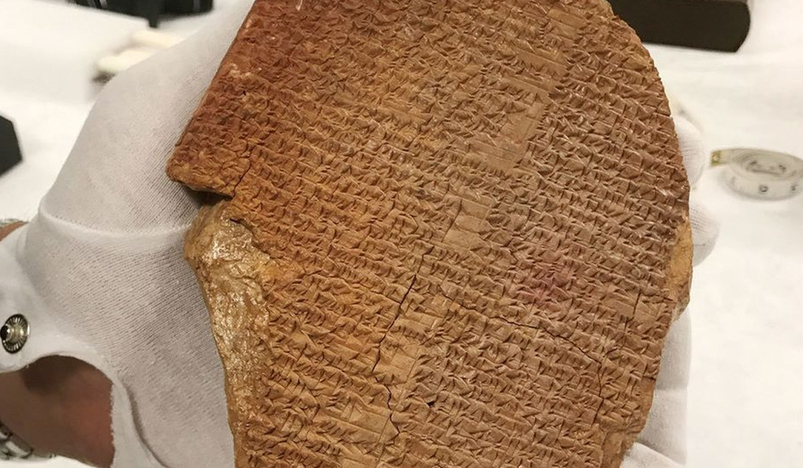
US authorities say the item was illegally imported into the US
An ancient clay tablet displaying part of the story of a superhuman king has been formally handed over to Iraq by the US.
Known as the Gilgamesh Dream Tablet, the 3,600-year-old religious text shows a section of a Sumerian poem from the Epic of Gilgamesh.
It is one of the world's oldest works of literature and was looted from an Iraqi museum during the Gulf War in 1991.
Over the past 30 years, it has been smuggled through many countries, accompanied by false documents. Until just two years ago, it was prominently displayed in a museum near the seat of the US government.
But on Thursday, the text began a new journey back to its homeland when it was formally handed over at a ceremony in the Smithsonian Institution in Washington DC.
The Epic of Gilgamesh is the oldest recognised epic poem. Parts of its stories are mirrored in the Hebrew Bible.
The tablet is written in the Akkadian language in cuneiform script - a system of writing on clay used in ancient Mesopotamia thousands of years ago.
Scholars discovered it in 1853, when a 12-tablet version was found in the ruins of the library of an Assyrian king, Assur Banipal, in northern Iraq.
The events revolve around King Gilgamesh of Uruk - an area corresponding to southern Iraq. The myth is based on a real king who ruled sometime between 2,800 and 2,500 BC.
As the story goes, King Gilgamesh was a demigod of superhuman strength whose powers were inherited from his mother.
Accompanied by a companion, a man raised by animals, he killed the Bull of Heaven, representing the violence of the gods, and tried to discover the secret to eternal life.
In another adventure he swam to the bottom of the sea to collect an immortalising plant, which was then stolen from him by a serpent.
The Dream tablet recounts a part of the epic in which the hero describes his dreams to his mother, who interprets them as announcing the arrival of a new friend, who will become his companion.
"His strength is as mighty as a lump of sky rock... You will see him and your heart will laugh," she tells him.
In another column of the tablet, a woman takes Gilgamesh's companion to a shepherd's camp for a sexual encounter.
Sometime during the Gulf War in 1991, the Gilgamesh Dream tablet was stolen from a museum in Iraq.
Little is known about what happened to it until 2003, when an antiques dealer bought it, dusty and unreadable, from a coin dealer in London.
The dealer shipped the tablet to the US by international post without declaring formal entry.
Once in the US, a cuneiform expert recognised it as bearing a part of the Gilgamesh epic.
In 2007, the dealer sold the tablet to another buyer with a false letter stating that it had been inside a box of ancient bronze fragments purchased in 1981.
It was sold again several times at auction in different countries before being bought in 2014 in a private sale by Hobby Lobby, an arts and crafts firm with a conservative Christian ethos.
The company paid more than $1.67m (£1.2m) for the tablet, which was prominently displayed in its Museum of the Bible in Washington DC.
In 2017, Hobby Lobby was fined millions of dollars for mislabelling thousands of Iraqi artefacts acquired by its museum.
The artefacts were smuggled into the US through the United Arab Emirates and Israel, with falsified shipping labels claiming the packages contained "ceramic tiles".
"The Company was new to the world of acquiring these items, and did not fully appreciate the complexities of the acquisitions process. This resulted in some regrettable mistakes," Hobby Lobby said at the time.
That same year, a curator at the museum started to research the provenance of the Gilgamesh Dream Tablet. The museum also informed the Iraqi government that the item was in its possession.
When doubts emerged over the tablet's origin, the Museum of the Bible launched legal proceedings against Christie's auction house, which had arranged the sale, claiming the auctioneers had provided false information. Christie's denies any knowledge that the tablet was illegally imported.
The tablet was seized from the museum by US agents in 2019. In July, a US federal judge entered an order for its return to Iraq.
It is among 17,000 looted antiquities that the US has agreed to hand back to Iraq.
"By returning these illegally acquired objects, the authorities here in the United States and in Iraq are allowing the Iraqi people to reconnect with a page in their history", said Audrey Azoulay, Director General of the UN cultural organisation Unesco.
"This exceptional restitution is a major victory over those who mutilate heritage and then traffic it to finance violence and terrorism."
Once in Iraq, the tablet will be sent to the National Museum in Baghdad, where the dreams of the mythical King Gilgamesh will be preserved once again in their rightful home.
SOURCE: BBC
.jpg)
Qatar Secures Place Among the World's Top 10 Wealthiest Nations
.jpg)
Hamad International Airport Witnesses Record Increase in Passenger Traffic

Saudi Arabia: Any visa holder can now perform Umrah

What are Qatar's Labour Laws on Annual Leave?
Leave a comment